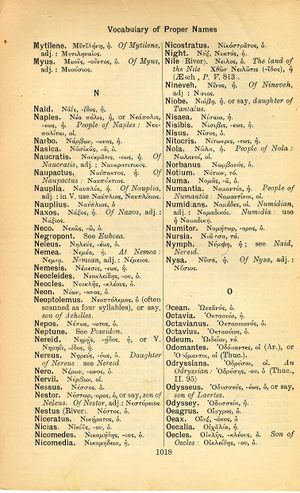Numa
τί δ' ἢν ῥαφανιδωθῇ πιθόμενός σοι τέφρᾳ τε τιλθῇ, ἕξει τινὰ γνώμην λέγειν τὸ μὴ εὐρύπρωκτος εἶναι; → What if he should have a radish shoved up his ass because he trusted you and then have hot ashes rip off his hair? What argument will he be able to offer to prevent himself from having a gaping-anus | but suppose he trusts in your advice and gets a radish rammed right up his arse, and his pubic hairs are burned with red-hot cinders. Will he have some reasoned argument to demonstrate he's not a loose-arsed bugger
English > Greek (Woodhouse)
Νομᾶς, -ᾶ, ὁ.
Latin > English (Lewis & Short)
Nŭma: ae, m.,
I a Roman proper name.
I Numa Pompilius, the second king of Rome, Liv. 1, 18 sq.; Cic. Rep. 2, 13, 25; 2, 18, 33; Ov. F. 2, 69; id. ib. 3, 305 sqq.; Juv 3, 16; 8, 156 al.—
II Numa Marcius (Martius), a Sabine, a friend of the former and high-priest, Liv. 1, 20; Tac. A. 6, 11.
Latin > French (Gaffiot 2016)
Nŭma,¹⁰ æ, m., Numa Pompilius [deuxième roi de Rome] : Liv. 1, 18, 1 ; Cic. Rep. 2, 25 ; Ov. F. 2, 69.
Latin > German (Georges)
Numa, ae, m. (Stamm NUM, wov. auch numerus, num-mus), der Ordner, Gesetzgeber, Name des zweiten röm. Königs, s. Pompiliusdas Nähere.

